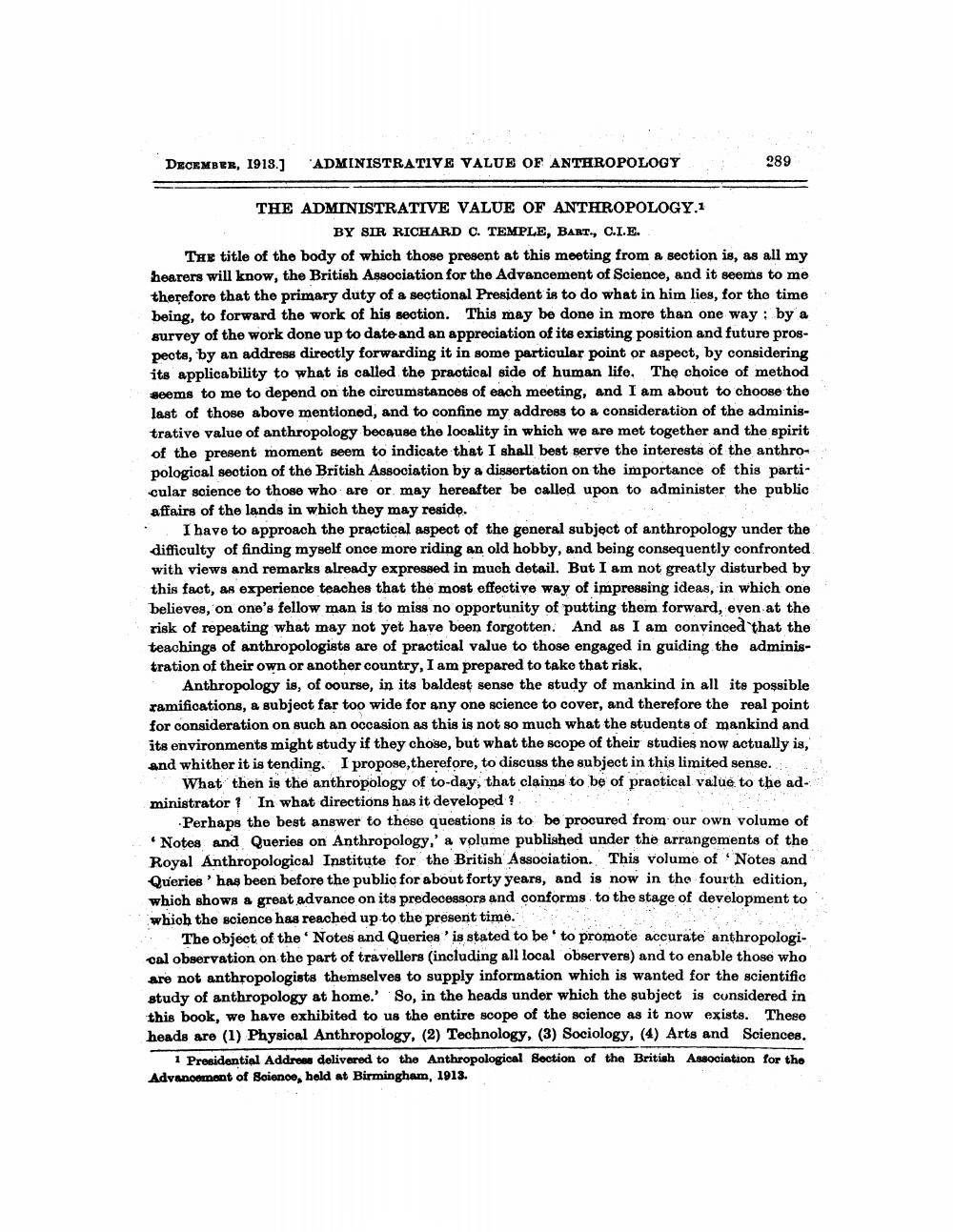________________
DECEMBER, 1918.) 'ADMINISTRATIVE VALUE OF ANTHROPOLOGY
289
THE ADMINISTRATIVE VALUE OF ANTHROPOLOGY.1
BY SIR RICHARD C. TEMPLE, BART., C.I.E. THE title of the body of which those present at this meeting from a section is, as all my hearers will know, the British Association for the Advancement of Science, and it seems to me therefore that the primary duty of a sectional President is to do what in him lies, for the time being, to forward the work of his section. This may be done in more than one way : by a survey of the work done up to date and an appreciation of its existing position and future progpeots, by an address directly forwarding it in some particular point or aspect, by considering its applicability to what is called the practical side of human life. The choice of method seems to me to depend on the circumstances of each meeting, and I am about to choose the last of those above mentioned, and to confine my address to a consideration of the administrative value of anthropology because the locality in which we are met together and the spirit of the present moment seem to indicate that I shall best serve the interests of the anthropological section of the British Association by a dissertation on the importance of this particular science to those who are or may hereafter be called upon to administer the public affairs of the lands in which they may reside. . I have to approach the practical aspect of the general subject of anthropology under the difficulty of finding myself once more riding an old hobby, and being consequently confronted with views and remarks already expressed in much detail. But I am not greatly disturbed by this fact, as experience teaches that the most effective way of impressing ideas, in which one believes, on one's fellow man is to miss no opportunity of putting them forward, even at the risk of repeating what may not yet have been forgotten. And as I am convinced that the teachings of anthropologists are of practical value to those engaged in guiding the administration of their own or another country, I am prepared to take that risk.
Anthropology is, of course, in its baldest sense the study of mankind in all its possible ramifications, a subject far too wide for any one science to cover, and therefore the real point for consideration on such an occasion as this is not so much what the students of mankind and its environments might study if they chose, but what the scope of their studies now actually is, and whither it is tending. I propose, therefore, to discuss the subject in this limited sense...
What then is the anthropology of to-day, that claims to be of practical value to the administrator? In what directions has it developed ?
Perhaps the best answer to these questions is to be procured from our own volume of Notes and Queries on Anthropology,' a volume published under the arrangements of the Royal Anthropological Institute for the British Association. This volume of Notes and Queries has been before the public for about forty years, and is now in the fourth edition, which shows a great advance on its predecessors and conforms to the stage of development to'. which the science has reached up to the present time.
The object of the Notes and Queries' is stated to be to promote accurate anthropological observation on the part of travellers (including all local observers) and to enable those who are not anthropologists themselves to supply information which is wanted for the scientific study of anthropology at home.' So, in the heads under which the subject is considered in this book, we have exhibited to us the entire scope of the science as it now exists. These heads are (1) Physical Anthropology, (2) Technology, (3) Sociology, (4) Arts and Sciences.
1 Presidential Address delivered to the Anthropological Section of the British Association for the Advancement of Science, held at Birmingham, 1913.




